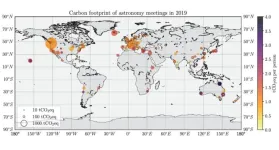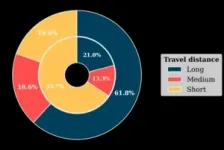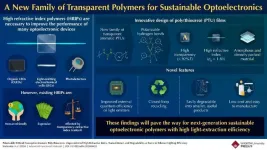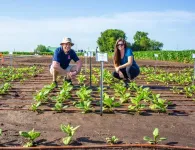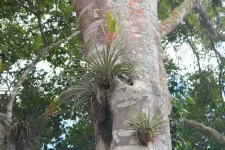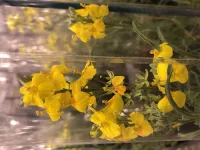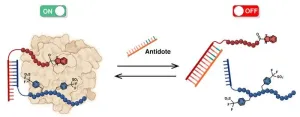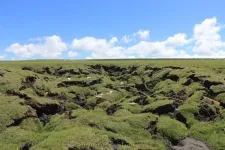(Press-News.org) The carbon emissions associated with air travel to professional conferences make up a sizable fraction of the emissions produced by academia. Andrea Gokus and colleagues estimated the CO2-equivalent emissions for conference travel to all 362 open meetings in the field of astronomy in 2019. The total is an estimated 42,500 tCO2e, or about one ton per participant per meeting. According to the authors, networking and discussing new scientific developments at meetings is important for advancing the field, but adjustments can be made to reduce the hefty carbon cost. Holding meetings virtually almost completely eliminates emissions, but virtual meetings are often not regarded as efficient networking opportunities. Meeting organizers can also reduce carbon costs by preferentially locating venues as close as possible to the majority of participants, avoiding scenarios in which most participants are flying intercontinentally. However, the authors add, it is also important to provide opportunities for astronomers located far from today’s North American and European astronomy hubs. The authors also propose holding meetings at a small number of physical hubs, which are then virtually linked. As an example, if the American Astronomical Society meeting in 2019 was held in four global hubs (Seattle, WA; Baltimore, MD; Amsterdam, Netherlands; and Tokyo, Japan), attendance would generate 70% less carbon emissions than if it was held in Seattle alone. According to the authors, these approaches will also have the benefit of making astronomy meetings more inclusive, as traveling to meetings is often more difficult for astronomers from less-wealthy institutes; astronomers farther from North American and European hubs; astronomers who face complex visa bureaucracies; astronomers with disabilities; and women, who have disproportionately heavier childcare responsibilities.
END
The carbon emissions of academic astronomy
2024-04-30
ELSE PRESS RELEASES FROM THIS DATE:
Journal of Pharmaceutical Analysis articles reveal the importance of phytocompounds and metabolomics analysis
2024-04-30
IBD is a common chronic gastrointestinal disorder and current treatment strategies can cause adverse effects. Thus, there is a need to identify alternative compounds to treat IBD. Similarly, the dose-related toxicity and efficacy of anticancer drugs needs to be monitored accurately to improve the treatment outcomes. Moreover, over the years, plant-based therapeutic compounds and traditional Chinese medicine formulas have gained attention for their enhanced healing effects and are promising for various treatment regimens.
The recent issue of the JPA, published ...
Great strides in the development of high refractive index polymers for optoelectronics
2024-04-30
Optoelectronic devices have found their way into many aspects of our daily lives, from OLED displays to photodetectors, security systems, and environmental monitoring. In all the applications, these devices utilize high refractive index polymers (HRIPs) to control light.
In general, the optical properties of transparent HRIPs enable efficient light transmission and manipulation, allowing optoelectronics devices to guide and control the flow of light to improve their performance. However, there are no low-cost options for HRIPs that can guarantee good optical performance while being transparent and environmentally ...
Engineered increase in mesophyll conductance improves photosynthetic efficiency in field trial
2024-04-30
It is possible to engineer increased mesophyll conductance in plants according to new research from the University of Illinois. Mesophyll conductance plays a key role in photosynthesis and refers to the ease with which CO2 can diffuse through a leaf’s cells before reaching the location where it is ultimately turned into sugar to feed the plant (carbon fixation). CO2 faces barriers as it moves through the leaf, including its own cell walls. Researchers from the Long Lab found that by increasing permeability and slightly reducing the thickness of cell walls, they could increase CO2 diffusion and uptake in a model crop.
“This is one of the ...
Unlocking the genetic mysteries behind plant adaptation: New insights into the evolution of a water-saving trait in the pineapple family (bromeliaceae)
2024-04-30
Researchers at the University of Vienna, along with collaborators from France, Germany, Switzerland and the USA, have achieved a major breakthrough in understanding how genetic drivers influence the evolution of a specific photosynthesis mechanism in Tillandsia (air plants). This sheds light on the complex actions that cause plant adaptation and ecological diversity. The results of their study are now published in Plant Cell.
Some plant species have evolved a water-saving trait called Crassulacean Acid Metabolism (CAM). CAM plants like most ...
Childcare pick-up: a 1-hour window to build healthier eating habits
2024-04-30
Millions of working parents know the routine: bustle the kids off to childcare in the morning, work all day, then fight the daily traffic jams to get the kids back home. Something to drink, maybe a snack to munch, can help ease the commute.
Understandably, few parents take the time to think about the nutrients or calories involved, but experts at Cincinnati Children’s decided to take a closer look. Their eyebrow-raising findings were published April 27, 2024, in the journal Children’s Health Care.
The researchers took a fresh look at older data contained in daily food journals kept by more than 300 families of children who attended 30 childcare ...
MD Anderson and Replay announce FDA clearance of IND application for first-in-class PRAME-targeted TCR NK cell therapy for hematological malignancies
2024-04-30
HOUSTON, SAN DIEGO and LONDON ― The University of Texas MD Anderson Cancer Center and Replay today announced that the Food & Drug Administration (FDA) has issued a ‘safe to proceed’ for the Investigational New Drug (IND) application for PRAME TCR/IL-15 NK (SY-307), an engineered T cell receptor natural killer (TCR NK) cell therapy for relapsed/refractory myeloid malignancies. MD Anderson is the IND sponsor.
PRAME TCR/IL-15 NK (SY-307) is being developed by Syena, an oncology-focused product company launched by Replay and MD Anderson based on the scientific discoveries of Katy ...
Discovery of mechanism plants use to change seed oil could impact industrial, food oils
2024-04-30
PULLMAN, Wash. -- Researchers have discovered a new mechanism of oil biosynthesis and found a way to genetically engineer a type of test plant to more efficiently produce different kinds of seed oil that it otherwise wouldn't make.
While the engineering is proof-of-concept, this discovery could lead to improved production of valuable oils used in food and by a range of industries. The study, led by Washington State University researchers, was published in the journal Nature Communications.
“Scientists have been working on producing ...
A new anticoagulant with no risk of bleeding
2024-04-30
Anticoagulant treatments are crucial for managing many conditions, such as heart disease, stroke and venous thrombosis. Current options, however, carry an inherent risk of serious bleeding due to trauma or unforeseen events. A team from the University of Geneva (UNIGE) and the University of Sydney has developed a new anticoagulant, designed to have an on-demand reversible activity, with a fast-acting ‘‘antidote’’. This approach could revolutionise the use of anticoagulants in surgery or other applications. The mechanism of activation and deactivation of the active principle ...
Genetic adaptations have impacted the blood compositions of two populations from Papua New Guinea
2024-04-30
Papua New Guinea (PNG) has a wide range of environments, each presenting unique challenges to human survival. Highlanders and lowlanders of PNG are striking examples of populations facing distinct environmental stress. Whereas the highlanders encounter low oxygen availability due to altitude, the lowlanders are exposed to specific pathogens that are absent in the highlands, such as malaria. Despite these strong environmental pressures, the specific adaptations of these populations have remained overlooked. A new study published in Nature Communications on Tuesday, 30 April 2024 sheds light on the genetic adaptations of Papua New Guineans in response to their unique environmental ...
Abrupt permafrost thaw intensifies warming effects on soil CO2 emission
2024-04-30
According to a recent study published in Nature Geoscience, scientists have found that soil carbon dioxide (CO2) emissions are more sensitive to climate warming in permafrost-collapsed areas than in non-collapsed areas.
This study, based on field warming experiments combined with laboratory incubation of soils from a large-scale sampling, provides new insights about permafrost carbon–climate feedback in the context of future climate warming.
Warmer temperatures have led to rapid permafrost thawing in high-latitude and -altitude permafrost regions. Abrupt permafrost thaw, ...
